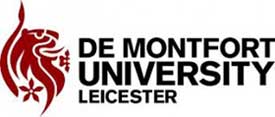Energy Engineering courses
De Montfort University

- UK
- World Rank : 601
- Visit Website
The production and utilisation of energy is a key global issue. Governments and industry are becoming increasingly aware of balancing energy production and utilisation with the need to be environmentally conscious and energy efficient.
This course addresses energy production, storage and utilisation. Develop your understanding of the production and efficient use of conventional and renewable energy sources for power generation, and modern energy storage solutions, complemented with elements of energy economics. With us, you will develop an strong understanding of key principles in engineering, mechanics, electricals and electronics. You will also explore more specialised modules including Energy for Transport Applications and Low Carbon Energy Technology.
You will have the opportunity to enhance your employability and gain industry experience by undertaking an optional work placement. Recent placements have taken place at major companies such as Cummins, Network Rail and Caterpillar. We also place a strong focus on employability through industry relevant modules, covering topics such as policy and project management.
Graduates of this course go on to a vast range of careers in production, utilisation, energy storage and management, design, research and development, environment control and policy making.
You can study Energy Engineering either as a three-year BEng (Hons) programme, or a four-year integrated Master’s MEng. At the end of year three, you have the option of graduating with a BEng (Hons) or continuing for a further year for a MEng, subject to meeting the progression requirements.
Key features
Plus, five GCSEs at grade 4 or above, including English and Mathematics or equivalent.
Alternative qualifications include:
Pass in one of the following QAA accredited Access to HE course with at least 15 level 3 credits in the relevant subject at distinction:
If you are studying an alternative Access course that is related to Engineering, Mathematics or Physics please contact us for more details.
English and Mathematics GCSEs are required as a separate qualification as equivalency is not accepted within the Access qualification.
We will normally require students to have had a break from full-time education before undertaking the Access course.
English language
If English is not your first language then an IELTS score of 6.0 overall with a minimum of 5.5 in each component (or equivalent) is essential.
| Type of Institution | Public |
| Campus Setting | Urban |
| Endowment | £1.17 million |
| Number of Campuses | 4 faculties |
| Number/Percentage of International Students | 23205 |
| Total number of Professors | 3240 |
| Student Satisfaction Rate | 86% |
| Graduate Job Rate | 97.3% |
| Number of Residence Vacancy | Around 3000 |
| International fee | Undergraduates- £13240 (annual) Postgraduates- £15950 (annual) |
| Number of Academic Programs | UG, PG, Part time, distance, blended |
| Mode of Program | Full time, distance and online |
| Average Graduate Salary | 19800 pounds a year |
| Field of Study | Avg.Fees |
|---|---|
| Art, Design and Humanities: | £13,750 |
| Business and Law | £13,750-£14,550 |
| Media | £13,750 - £14,250 |
| Engineering | £14,250 |
| Computing | £14,250 |
| Health and Life Sciences | £13,250 - £14,250 |
| Nursing BSc | £14,950 |
| Expenses | Estimated cost in pounds |
|---|---|
| Undergraduate tuition fee | 13,250- 14950 |
| Postgraduate tuition fee | 13600-15,900 |
| On campus accommodation | 5,000-6040 |
| Average cost of living | 97-110 per week |
DMU International Scholarship up to 1500 pounds
| Tuition Fees in UK (1st Year Average) | MS: £17276 | MBA: £17276 | BE/Btech: £16632 | BBA: £15130 | BSc: £16632 | MFin: £19000 | MA: £15560 | MIM: £18241 | MEM: £16950 | MArch: £14271 | BHM: £12662 | MIS: £15344 | MEng: £12876 | MBBS: £28865| MPharm: £15452 |
| Average Accomodation & Food Costs in UK | £850 to £1,050 a month |
| Entrance Exams in UK | TOEFL: 88 | IELTS: 6.5 | PTE: 59 | GMAT: 590 |
| Work and Study in UK | Permitted for 20 hours/week with a valid study permit. |
| Post Study Work Permit in UK | 2 Year after graduation depending on the course. |
| Cost of Student Visa in UK | £348 |
| Student Visa in UK | Your nationality, duration of your stay and purpose of your stay are the three essential factors for UK visa. For Non-EU students UK visa is mandatory. |
| Intakes in UK | There are mainly two intakes in UK: January/February & September/October. |
| Top Job Sectors in UK | IT Engineering, Product Design, Mobile Development, Designers, Logistics, etc. |
| Economy in UK | Growth Rate: 1.3% (2018) 1.4% (2019) 1.4% (2020e), 6th Largest Economy in the World by Nominal |
Tuition & fees :
£ 14,250
Hostel & Meals :
£ 6,063
Total
£ 20,313